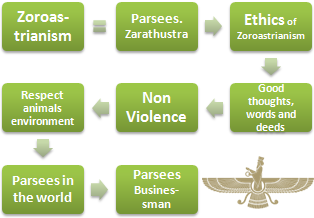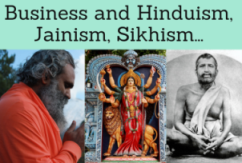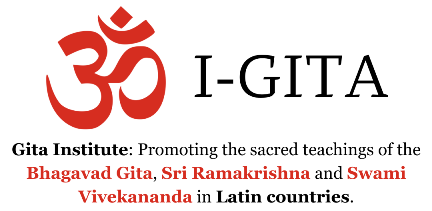Zoroastrianism, Business, Ethics, Cyrus Poonawalla

Zoroastrian Ethics: Good thoughts, words, deeds. Parsee Businesspeople, Cyrus Poonawalla (India)

The Subject “Zoroastrianism, Ethics and Business” consists of two parts:
1- Introduction to Zoroastrianism
- Introduction to Zoroastrianism
- Zarathustra
- Ethical Principles of Zoroastrianism
- Non-Violence
- Respect for Animals and Environment
- The 3H (Good thoughts, words, and deeds) and Business Strategy
- Parsees in the World
- Influence of Zoroastrianism on the Hindu Economic Area
“Good Thoughts, Words, and Deeds.”
2- Zoroastrian Businesspeople.
- Adi Godrej
- Cyrus S. Poonawalla, Director of the Serum Institute of India
- Wadia Family
- Tata Group, the Zoroastrian Business Connection in India (Bharat)
Zoroastrianism, Ethics and Business

The objectives of the subject “Zoroastrianism, Ethics and Business” are the following:
- To understand the fundamentals of Zoroastrianism
- To know the ethical principles of the Parsees
- To learn about the influence of Zoroastrianism on business
- To analyze the cases of “Zoroastrian” companies and Businesspeople
- To understand the influence of Zoroastrianism on the Hindu Civilization


The Subject “Zoroastrianism, Ethics and Business” belongs to the following Online Programs taught by EENI Global Business School:
Doctorates: Global Ethics, Religions, and International Business, Asian Business.
Masters: International Business, Religions and International Business.
 Masters adapted to Indian Students (Bharat).
Masters adapted to Indian Students (Bharat).
Course: Indian Religions and Business.
Why study “Zoroastrianism and Business”?.
Languages:  or
or  Zoroastrismo
Zoroastrismo  Zoroastrisme.
Zoroastrisme.
- Credits of the Subject “Indian Religions - Zoroastrianism”: 4

- Duration: 4 weeks
- Download the syllabus: “Indian Religions” (PDF)

Zoroastrianism, Ethics and Business.
What do they share the owners of the TATA conglomerate, with the famous music conductor Zubin Mehta, with the top model Nauheed Cyrusi, with Freddy Mercuri, with Ardeshir Darabshaw Shroff (author of the Bombay Plan), with the owner of the largest brewery of Pakistan, with the prominent Indian family Wadia, PhD Poonawalla or with the Godrej Group?
The common factor in all of them is their religion: Zoroastrianism, the religion of Zarathustra, the great reformer. The Parsees have played a major role in the creation of modern India.

Today we can consider that the Gatha, part of the sacred books of the Avesta, is surely the first ethical treaty of Humanity.
If we summarized the Zoroastrian ethics this would be:
“Good Thoughts, Good Words, Good Deeds” (3 H Zoroastrian).
Everything created by Ahura is good, badness and goodness are generated in the human being, in his thoughts, and through their words converted in deeds. That is, the kindness should be practiced in three areas: in thoughts, in words which express them, and deeds they generate.
Perhaps this concept, together with the respect for the animals and environment and the principle of freedom that we find in the Gatha is a crucial contribution to our research for the principles of a global ethic.
“Goodness and Badness, twin spirits, at the beginning of the universe
They are in the thought, in the deeds and the words,
The wise men will choose goodness and fools will be diverted. The ignorant will choose the worst attitude
Oh, Ahura! I want to be part of You. Among those who renew and make thrive the world” Gatha 3,30
Ethical Principles of Zoroastrianism
- Good thoughts, good words, and good deeds
- Truthfulness, honesty, justice, and righteousness
- Universal love
- Tolerance
- Non-Violence (Ahimsa). Respect for environment and animals
The principle of non-violence is large enough, and a vital significance for humanity. Moreover, is one of the global ethics principles. Derived from the principle of Non-Violence; we will find an enormous respect of the Parsees to the animals and environment.
Arising from the above principles, we can identify another feature of the Zoroastrian ethics: honesty and uprightness (righteousness), the guarantee to achieve the happiness. Justice is also a core value of the Zoroastrian people.
Perhaps the core of Zoroastrianism is the capacity of the decision of the man between goodness and badness.
Many of the ethical principles of Zoroastrianism can be found (adapted or modified) in other religions. The principle of Non-Violence, the need for good thoughts, words, and deeds or truthfulness are present in the Indian religions like Hinduism and Jainism. In Buddhism, especially Mahayana, there are influences of Zoroastrianism.
It is hard to know the influence of Taoism or Confucianism, but what is certain is that they share many values. It is also crucial the influence on Christianity, Judaism, and Islam.
Zoroastrianism/Parsees.
- Prophet: Zarathustra (568 BCE)
- Country of Origin: Persia (Iran)
- Holy book: Avesta. Gatha
- Zoroastrian Community: Parsees (India)
- Good: Ahura Mazda
- Followers: between 145,000 and 250,000
- Main cities: Gujarat and Mumbai (India). Parsees communities are also significant in Mumbai

Some famous Parsees Businessman: Sir Dinshaw Maneckji Petit, Jehangir Hormusjee Ruttonjee, Ardeshir Darabshaw Shroff (co-author of the Bombay Plan of post-independence India, former Director of Tata), Byram Dinshawji Avari, Keki Dadiseth, or Minocher Bhandara.
Sacred Symbol of Zoroastrianism: Faravahar



(c) EENI Global Business School (1995-2024)
We do not use cookies
Top of this page




